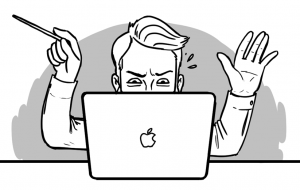Today, a UX designer is quite as much accountable for the success -or not- of a product than his/her mate CPO or product owner. They share responsibility to build a useful, usable, enjoyable and engaging product.
If you read our articles for a while, you know that you will have to think about hiring a UX designer one day.
He / She may become a key resource in your strategy, working to avoid customer frustration, leveraging product adoption and customer retention.
But are UX designers really the magic key to success that make them so popular today?
In which case should you consider to hire for this position?
Editor note: in this article we consider the UX designer as the person who design and build experiences and UX improvements – not necessarily taking part in the UI / web design. You may find people and companies talking of UX strategist or UX architects as well.
What a UX Designer brings
The UX Designer in a team has a central role in the product development.
He works closely with product / design / customer / support teams (basically: everyone involved in the project) to gather feedback, measure, understand, prioritize, then action levers to improve the user experience delivered by the product.
He will be responsible for users’ happiness – making the link between the product and its users.
Actually, you will have someone to ensure that everything goes fine (or in the right direction) with your product on the user’s side, and that is quite a responsibility.
Staffing is the first problem
UX Design is recent discipline, and because few schools are up to train people in this field, we often notice that people specialized in UX Design originally come from other responsibilities where they acquired experience, mostly from those areas:
- product management
- web & UI design
- ergonomics & cognitive sciences
- customer service / CRM / communication management
- Bonus: from food service to UX 😉
What does it mean?
- It may be hard to find the UX Designer you look for. They are few, very popular profiles today. So they are expensive profiles.
- The person you will hire for the position is not necessarily a UX Designer already
- All UX Designers won’t have the same work approaches or techniques, depending their past responsibilities (product, design, customer care…), and you may have to adapt your workflow to their specificities.
Can you live without a UX Designer?
UX Design is not necessarily a specialization of Web Design, we explained.
As its importance for online businesses has been illustrated many times over, it is likely that everyone in your team already started to care about UX concerns.
For instance :
- your product owner is already asking himself how the user will solve his problem thanks to this feature, instead of what this feature must make possible
- your web designer cares above all about the usability that bring users to the target you defined, he probably restricts his creativity for rationality
- your customer service manager is already asking himself how he could optimize interfaces to prevent problems to happen, instead of how he can solve problems after
UX Design is multidisciplinary.
UX Design is not only about design, usability, customer care .. it is a comprehensive approach in which all your team should take part.
You must support and encourage however in your team would initiate such way to improve the UX delivered by your product. This demonstrates that your people are actually involved in your target to succeed with a great product – beyond the limited responsibilities their title imply.
This, not mentionning it develops their skills in UX and may lead you to later nominate someone from your team for this position of UX Designer, when you will need someone to focus on this.
Must-have, or nice-to-have resource?
We don’t pretend everyone can be a UX Designer.
What we think, is:
- appart from technical aspects of navigation and usage, what elaborates interesting user experiences rest before all on logic and experience with customers
- UX design implies multidisciplinarity that give a common objective to your team before you have someone dedicated to UX Design care
The truth is:
Your users deserve a UX conductor

ThinkBrownstone made this illustration that fit perfectly with our topic. Courtesy of them, read how Jesse Livingstone became an Experience Designer after beeing an orchestral conductor. Another point for UX Designers’ diversity in profiles!
Your product won’t reach success without delivering a great user experience. Before hiring a UX Designer, you can first incentive your people (in design, customer care, product..) to work in a user-centric approach.
As your project grow, this approach must get more and more real. Then become your main focus point, under the responsibility / conducting of your UX designer.
UX-as-a-Service is a myth
There is no such thing as Ux-as-a-Service. And believe us, as we build a software for user experience optimization, we would like to be able to say there is.
User experience requires analysis, understanding, and application, sometimes on very specific and irrational details, which prevent any machine or software to replace a Human on these responsibilities. (maybe AIs will surprize us one day, Ed.)
However, whatever how your organization works (with a UX designer, or with a user-centric team of people in product/design..), numerous tools can help your UX strategy, for user research, user testing, ux design, feedback collection, a/b testing, gamification, etc.
Read : our list of UX tools for User Journey Optimization
Questions to ask yourself
This resource should help you determine if you need a UX designer.
– According to your resources:
- do you already have people in your team in charge of the product? of the design? of the customer service?
- are they ready to change their workflow? can they process more work?
- do you need or not an additional designer?
Investing too soon in a UX Designer is not necessarily a good choice, it’s a matter of organization. You must be able to put people together around this new ressource and ensure that your UX designer is able to have a decision-making power on the rest of the team.
All UX designers do not design. Some just prototype, or manage your UX strategy. Choose yours paying attention to the resources you already have. For instance, if your UI designer in position does a good job, he will probably make a great team with a UX designer having a product management background.
– According to your timing and strategy:
- is your product in alpha, in beta, released already?
- do you want to optimize something existing or develop something new?
UX designers are adapted for both situation. But if you are not in a agile stategy (product in constant, iterative evolution that care about users’ feedback), maybe you don’t need a UX designer. Because conducting user research without capitalizing on the result of this work in your development roadmap is a waste of energy.
– According to your product characteristics:
- will it require regular or continuous improvement?
- is your goal more to develop a competitive advantage, or stick with his market’ expectations?
- do people in your target need to be outstandingly thrilled by the usage for some specific reason?
Every product deserve a UX designer, but some even more than others.
As an example, e-commerce products won’t need the same care to interfaces and navigation, if they sell windscreen wipers (‘must-have’ product, recurrent purchase once a year, with few competitive advantage and small price difference from one brand to another) or fine chocolate (‘nice-to-have’ product, no fixed recurrence, full price range from ‘entry level’ to ‘deluxe products’ even for a same brand).
Last but not least, entertainment products (compared to “utile” products that solve a problem for a specific market) are interesting examples where everything relies on user experience.
Think about it, and share your thoughts!

 Why Startups Should Not Seek Media Buzz At Any Cost
Why Startups Should Not Seek Media Buzz At Any Cost Psychology of Choice applied to Web & App Design: Convince Clients!
Psychology of Choice applied to Web & App Design: Convince Clients! The Buyer Journey: Nothing More Than a Series of Questions To Answer
The Buyer Journey: Nothing More Than a Series of Questions To Answer